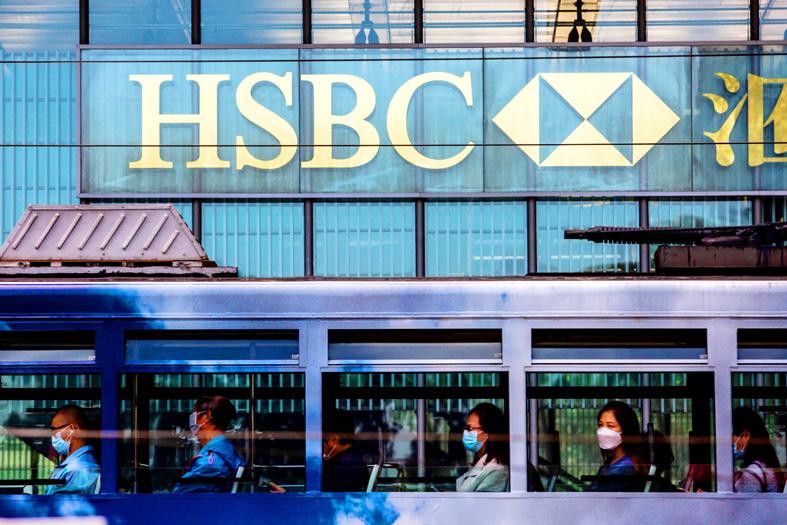HSBC Holdings PLC yesterday said that first-quarter profit dropped nearly 30 percent owing to higher-than-expected credit losses and inflation, but the Asia-focused lending giant remained upbeat about its outlook.
The London-based bank announced pretax profit of US$4.2 billion for January to last month, down 28 percent year-on-year, but beating estimates, while reporting that revenue declined 4 percent to US$12.5 billion.
“While profits were down on last year’s first quarter due to market impacts on wealth revenue and a more normalized level of ECL [expected credit losses], higher lending across all businesses and regions, and good business growth in personal banking, insurance and trade finance bode well for future quarters,” HSBC Holdings chief executive officer Noel Quinn said in a statement.

Photo: AFP
The lender reported ECL of US$600 million, compared with a release of US$400 million from the same period last year.
The bank said it continued to expect “mid single-digit percentage” growth this year for revenue and lending respectively.
Yesterday’s results came against the backdrop of Russia’s invasion of Ukraine, which the bank said was exacerbating inflationary pressures and contributing to higher ECL charges for the quarter.
“The repercussions from the Russia-Ukraine war, alongside the economic impacts that continue to result from COVID-19, have pushed up the prices of a broad range of commodities, with the resulting increase in inflation creating further challenges for monetary authorities and our customers,” the bank said.
Quinn said that the “vast majority” of HSBC Holdings’ business in Russia serves multinational corporate clients headquartered in other countries, and the bank was implementing sanctions put in place by the UK and other governments.
However, it forecast that its operation in Russia might become “untenable” if subject to further restrictions.
HSBC Holdings has embarked on a multiyear strategic pivot to Asia and the Middle East, and yesterday it said that while pandemic restrictions were lifting across much of the globe, key markets such as China and Hong Kong remained committed to strict controls.
“China’s government-imposed lockdown restrictions in major Chinese cities have impacted China’s economy, Asia tourism and global supply chains adversely,” it said.
China has high case counts in multiple cities and has locked down its finance hub, Shanghai, for the past month.
Meanwhile, Hong Kong — HSBC Holdings’ largest market — has entered its third year of strict pandemic controls that have isolated it from the rest of the world and hit businesses hard.

South Korea’s equity benchmark yesterday crossed a new milestone just a month after surpassing the once-unthinkable 5,000 mark as surging global memory demand powers the country’s biggest chipmakers. The KOSPI advanced as much as 2.6 percent to a record 6,123, with Samsung Electronics Co and SK Hynix Inc each gaining more than 2 percent. With the benchmark now up 45 percent this year, South Korea’s stock market capitalization has also moved past France’s, following last month’s overtaking of Germany’s. Long overlooked by foreign funds, despite being undervalued, South Korean stocks have now emerged as clear winners in the global market. The so-called “artificial intelligence

‘SEISMIC SHIFT’: The researcher forecast there would be about 1.1 billion mobile shipments this year, down from 1.26 billion the prior year and erasing years of gains The global smartphone market is expected to contract 12.9 percent this year due to the unprecedented memorychip shortage, marking “a crisis like no other,” researcher International Data Corp (IDC) said. The new forecast, a dramatic revision down from earlier estimates, gives the latest accounting of the ongoing memory crunch that is affecting every corner of the electronics industry. The demand for advanced memory to power artificial intelligence (AI) tasks has drained global supply until well into next year and jeopardizes the business model of many smartphone makers. IDC forecast about 1.1 billion mobile shipments this year, down from 1.26 billion the prior

People stand in a Pokemon store in Tokyo on Thursday. One of the world highest-grossing franchises is celebrated its 30th anniversary yesterday.

Chinese artificial intelligence (AI) start-up DeepSeek’s (深度求索) latest AI model, set to be released as soon as next week, was trained on Nvidia Corp’s most advanced AI chip, the Blackwell, a senior official of US President Donald Trump’s administration said on Monday, in what could represent a violation of US export controls. The US believes DeepSeek will remove the technical indicators that might reveal its use of American AI chips, the official said, adding that the Blackwells are likely clustered at its data center in Inner Mongolia, an autonomous region of China. The person declined to say how the US government received